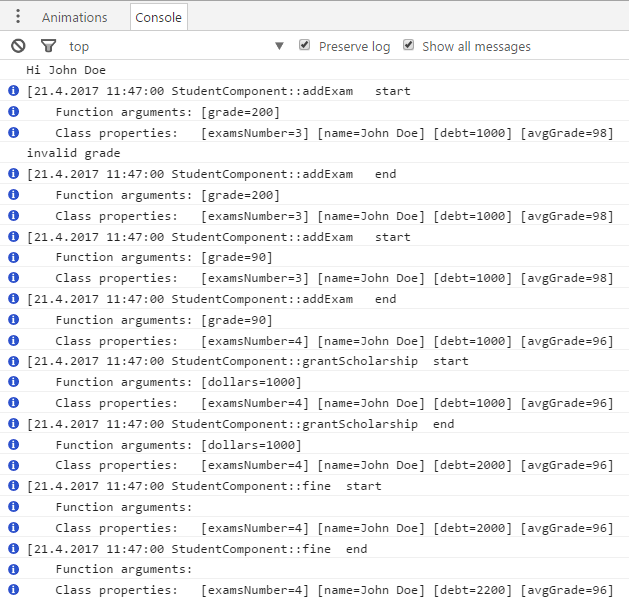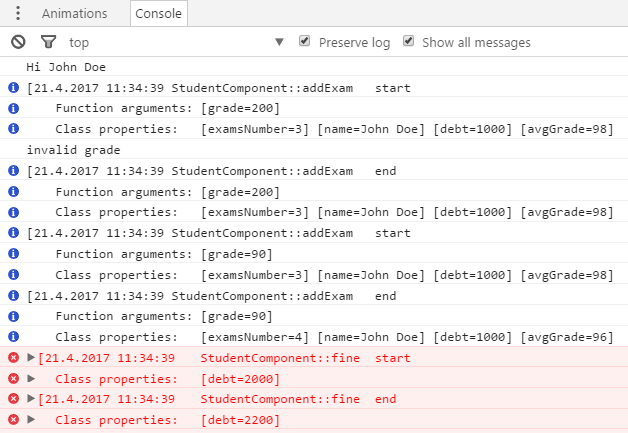https://github.com/dormd/rich-logger-decorator
Rich Logger Typescript Decorator for Easy Coding & Debugging
https://github.com/dormd/rich-logger-decorator
angular debugging decorators javascript nodejs typescript web
Last synced: 3 months ago
JSON representation
Rich Logger Typescript Decorator for Easy Coding & Debugging
- Host: GitHub
- URL: https://github.com/dormd/rich-logger-decorator
- Owner: dormd
- License: mit
- Created: 2017-04-16T13:07:21.000Z (over 8 years ago)
- Default Branch: master
- Last Pushed: 2017-12-18T15:35:17.000Z (almost 8 years ago)
- Last Synced: 2025-05-02T17:59:48.464Z (5 months ago)
- Topics: angular, debugging, decorators, javascript, nodejs, typescript, web
- Language: TypeScript
- Homepage: https://medium.com/@dormoshe/rich-typescript-logger-decorator-for-easy-coding-fc2ff73684c6
- Size: 130 KB
- Stars: 99
- Watchers: 1
- Forks: 19
- Open Issues: 8
-
Metadata Files:
- Readme: README.md
- License: LICENSE
Awesome Lists containing this project
README
# rich-logger-decorator
Rich Logger Typescript Decorator for Easy Coding & Debugging
Read the [medium article](https://medium.com/@dormoshe/rich-typescript-logger-decorator-for-easy-coding-fc2ff73684c6) about the logger usage.
## Installation
`npm i rich-logger-decorator`
## Basic usage
In this example we will use only the ClassLogger decorator in order to log all the class methods.
```Typescript
import { ClassLogger } from 'rich-logger-decorator';
@ClassLogger()
class StudentComponent {
name: string;
debt: number;
avgGrade: number;
examsNumber = 0;
constructor(name: string, debt: number, avgGrade: number, examsNumber: number) {
console.log(`Hi ${name}`);
this.name = name;
this.debt = debt;
this.avgGrade = avgGrade;
this.examsNumber = examsNumber;
}
addExam(grade: number): void {
if (grade < 0 || grade > 100) {
console.log('invalid grade');
return;
}
this.avgGrade = (this.avgGrade * this.examsNumber + grade) / ++this.examsNumber;
}
fine(): void {
this.debt *= 1.1;
}
grantScholarship(dollars: number): void {
this.debt += dollars;
}
}
const stud = new StudentComponent('John Doe', 1000, 98, 3);
stud.addExam(200);
stud.addExam(90);
stud.grantScholarship(1000);
stud.fine();
```
The console looks like:

## Mixed decorators and options
In this example we use the **ClassLogger** and **DiableMethodLogger** decorators with the default options and the **MethodLogger** decorator with custom options.
```Typescript
import { ClassLogger, Logger, DisableMethodLogger } from 'rich-logger-decorator';
@ClassLogger()
class StudentComponent {
name: string;
debt: number;
avgGrade: number;
examsNumber = 0;
constructor(name: string, debt: number, avgGrade: number, examsNumber: number) {
console.log(`Hi ${name}`);
this.name = name;
this.debt = debt;
this.avgGrade = avgGrade;
this.examsNumber = examsNumber;
}
addExam(grade: number): void {
if (grade < 0 || grade > 100) {
console.log('invalid grade');
return;
}
this.avgGrade = (this.avgGrade * this.examsNumber + grade) / ++this.examsNumber;
}
@Logger({
withClassProperties: ['debt'],
withTime: true,
logFunction: console.error
})
fine(): void {
this.debt *= 1.1;
}
@DisableMethodLogger()
grantScholarship(dollars: number): void {
this.debt += dollars;
}
}
const stud = new StudentComponent('John Doe', 1000, 98, 3);
stud.addExam(200);
stud.addExam(90);
stud.grantScholarship(1000);
stud.fine();
```
The console looks like:

## @Logger decorator
The **Logger** decorator needs to be on top of the function you want to log. The log messages will be printed before the function will start and after the function will end. This decorator can get options that defines the behavior of the flow and, eventually, affecting the log messages.
When the options do not supply, the `defaultFunctionLoggerOptions` object is used by the decorator. The options are defined by the `FunctionLoggerOptions` interface
### FunctionLoggerOptions
This is the interface of the **Logger** decorator options argument.
**Function logger options interface**
As you can see the interface contains some properties.
- **withArgs** — this property can be boolean or array of strings. When the value is `false`, the arguments and their values will not be a part of the log message. When the value is `true`, all the argument and their values will be a part of the log message. When the value is `array of strings`, the arguments, that their names contained in the array, will be a part of the log message.
- **withTime** — when the value is true, the time will be a part of the log message.
- **withClassProperties** — when the value is `true` and the function is a method of a class, the class properties and their values will be part of the log message. This option can be also an `array of the properties names` of the class (will behave like ‘withArgs’, just for class properties).
- **logFunction** —a function that replace the traditional console.log. This function will be called with the log message in the start and the end of the original function.
- **formatAndLogFunction** — a function that gets the resulted string of the decorator flow and logs the customized message. This function gets the time, class name (if exist), function name, start/end log, strings array of the arguments and their values and strings array of the class properties and their values.
All of the options are optional.
**DefaultFunctionLoggerOptions**
`defaultFunctionLoggerOptions` is an object with default values for `LoggerOptions`.
The default values are:
- **withArgs** — true
- **withTime** — true
- **withClassProperties** — false
- **logFunction** — the console.log function
- **formatAndLogFunction** —no default value. When the value doesn’t exist, the default behavior happened.
## @ClassLogger decorator
The **ClassLogger** using by classes. When you put the decorator on top of the class definition, all the methods in the class are logged automatically.
As the Logger decorator, the decorator can get options that defines the behavior of the flow and eventually affects the log messages.
When the options do not supplied, the `defaultClassLoggerOptions` used by the decorator. The options are defined by the `ClassLoggerOptions` interface.
### ClassLoggerOptions
This is the interface of the **ClassLogger** decorator options argument.
**Class logger options interface**
As you can see the interface contains some properties.
- **methodOptions** — the options for the methods of the decorated class. Same as the options of the `Logger` function decorator.
- **loggedMethodsNames** — array of method’s names that being logged. When the option is undefined, all the class methods are logged.
All of the options are optional.
**DefaultClassLoggerOptions**
`defaultClassLoggerOptions` is an object with default values for `ClassLoggerOptions`. The default values are:
- **methodOptions** — same as `defaultLoggerOptions` of the function decorator.
- **loggedMethodsNames** — undefined (so all the class methods will be logged)
## Additional decorators
For more convienieng usage here are two more decorators.
### @DisableLogger decorator
When you are using the **ClassLogger** decorator (without the methods array option), all the class methods will be logged. In order to disable specific method for being logged, you can put the **DisableLogger** decorator before the method definition. This is clearer way to prevent the logger behavior than the method array option, because of the second one restricts us to write the method name in the array.
### @LoggerWithoutArgs decorator
This decorator is a syntactic sugar of the **Logger** decorator with `withArgs` option of `false`. Namely, the argument and theirs values will not be part of the log message. If another options will be provided, the decorator will use them, except for the `withArgs` option.